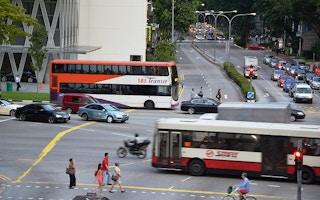Sustainability experts at the World Cities Summit on Tuesday launched a new report showcasing 10 ways cities can become ‘car-lite’, meaning, where people rely less on cars and more on public transport.
To continue reading, subscribe to Eco‑Business.
There's something for everyone. We offer a range of subscription plans.
- Access our stories and receive our Insights Weekly newsletter with the free EB Member plan.
- Unlock unlimited access to our content and archive with EB Circle.
- Publish your content with EB Premium.
Published by the non-profit Urban Land Institute (ULI) and Singapore’s Centre for Liveable Cities (CLC), the report titled “Creating Liveable Cities Through Car-lite Urban Mobility” aims to share lessons useful to other cities facing similar urban mobility challenges.
The 10 recommendations are:
1. Align visions, both internally and externally
2. Focus on people’s needs, work with competition and find win-win solutions
3. Create development-based mobility demand management strategies
4. Expand public transport amenities to cover the first-and-last-mile
5. Planning Matters!
6. Put a stop to cheap and easy parking
7. Turn street design on its head
8. Use public spaces as common ground for public-private-people collaborations
9. Drive change through data-driven research and pilots, and
10. Change mindsets and make car-lite mobility cool
“
The more important thing is to really approach mobility from people’s perspective, not cars.
Khoo Teng Chye, executive director, Centre for Liveable Cities
“While Singapore is already one of the forerunning cities in the world when it comes to promoting sustainable mobility, going car-lite is something that should happen to make the city-state more liveable,” said CLC executive director Khoo Teng Chye.
He added that the more important thing is to approach mobility from “people’s perspective”, not cars.
“Sustainable urban mobility is important to both emerging cities that are forming and existing cities that are redeveloping”, said ULI chief executive officer Patrick L. Phillips.
“We hope lessons distilled will also be useful to other cities facing similar urban mobility challenges,” he added.
The research was funded by ULI Foundation Annual Fund, which supports ULI projects across the globe that foster collaboration between the public and private sector on projects involving responsible land use to build sustainable, liveable and thriving cities.
The World Cities Summit is an annual gathering of the world’s top urban planning, transport and real estate development policy makers, experts, practitioners and industry representatives to discuss innovation and opportunities in creating liveable and sustainable cities. The summit takes place at Sands Expo & Convention Centre, Marina Bay Sands, Singapore from 10-14 July 2016.
The full report can be downloaded here.

















